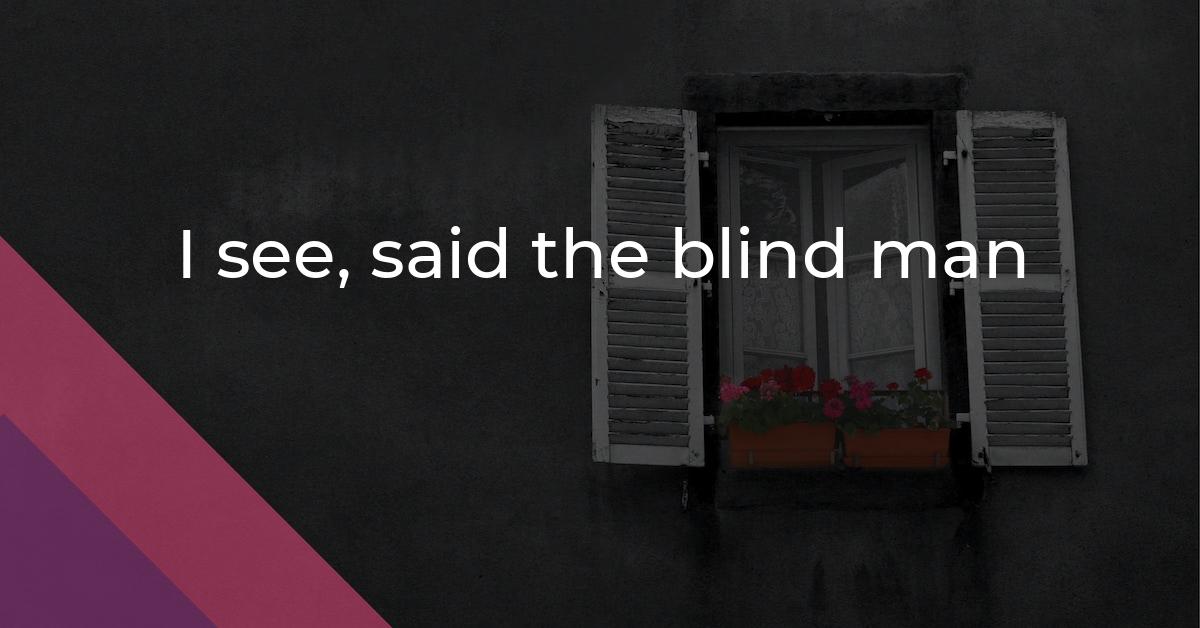I see, said the blind man: Idiom Meaning and Origin
What does ‘I see, said the blind man’ mean?
The idiom "I see, said the blind man" is a sarcastic remark used to question the credibility of a statement or to express doubt or disbelief. It suggests that the speaker understands or acknowledges the statement, even though they may not actually "see" it.

Idiom Explorer
The idiom "lay eyes on" means to see or look at something. It implies that the person looking at something has a strong desire or interest in it.
The idiom "I tell you" is used to emphasize the speaker's earnestness or certainty in what they are saying.
The idiom "I never did" is often used to express disbelief or surprise at something that someone has said or done. It conveys the speaker's strong reaction and implies that the action or statement is unexpected or contradictory to their expectations.
The idiom "in a pig's eye" is used to express disbelief or skepticism towards something, suggesting that it is highly unlikely or impossible to be true.
The idiom "I'm telling you" is used to emphasize the speaker's certainty or conviction about something they are saying. It serves to convince or persuade the listener to trust and believe what the speaker is telling them.
The idiom "I'll be" is an expression commonly used to convey surprise or disbelief. It is often used in response to unexpected or extraordinary events, indicating that the speaker is taken aback or astonished by what they have just witnessed or heard.
The idiom "I'd say" is used to express an opinion or estimate based on one's judgment or perception, often without definitive or factual evidence. It signifies a personal assessment or guess about a situation or statement.
The idiom "I don't know about that" is used to express doubt or skepticism towards a statement or proposition. It implies that the speaker does not have enough information or disagrees with the statement in question.
The idiom "I'd like to see someone try" means expressing a strong desire to witness someone attempt something perceived as challenging or impossible. It implies doubt or skepticism about the person's ability to succeed.
The idiom "I can tell you" means to confidently assert or affirm something, often used to emphasize the speaker's certainty about a statement. It implies that the speaker has knowledge or experience to support their claim.
Visionary Blind Man
The idiom "I see, said the blind man" is a well-known phrase used in English-speaking countries. It is often used as a humorous or sarcastic response to acknowledge something without fully understanding or believing it.
One theory suggests that this idiom may have originated from a popular joke or anecdote. In this anecdote, a blind man is told about a certain situation by a sighted person, to which the blind man responds with the phrase "I see." This response emphasizes the irony or absurdity of the blind man claiming to "see" something despite his visual impairment.
It's interesting to note that this idiom can be used in both literal and figurative contexts. In a literal sense, the blind man represents someone who is blind or visually impaired, and the phrase "I see" is used sarcastically to acknowledge something while highlighting the speaker's lack of actual vision.
In a figurative sense, the idiom can be applied to situations where someone may pretend to understand or be knowledgeable about a topic or situation, despite lacking the necessary insight or understanding. It serves as a playful way of acknowledging a statement or situation without necessarily agreeing or fully comprehending it.
The phrase is often used in informal or colloquial settings, such as everyday conversations, jokes, or light-hearted exchanges. It injects humor or irony into a conversation and can be seen as a playful way of acknowledging a statement or situation without necessarily agreeing or fully comprehending it.
The idiom "believe one's eyes" is related to the phrase "I see, said the blind man." It refers to the act of trusting what one sees and believing in its truth or accuracy. However, both idioms highlight the potential for irony and the possibility of someone not being able to fully comprehend or believe what they see.
Similarly, the idiom "in a pig's eye" is also related to the phrase "I see, said the blind man." It is used as a sarcastic or humorous response to express skepticism or disbelief in someone's claim. Just as the blind man's "I see" is ironic because of his lack of actual vision, "in a pig's eye" is used to sarcastically express doubt or disbelief in what someone is saying.
Despite its widespread use, the origin and earliest usage of the idiom "I see, said the blind man" remain uncertain. Linguists and etymologists continue to debate and speculate on its creation. Nevertheless, this idiom has become ingrained in the English language and is still used today, both in literal and figurative senses.
Example usage
Examples of how the idiom "I see, said the blind man" can be used in a sentence:
1. After explaining a complicated concept, my friend sarcastically responded with, "I see, said the blind man," implying that he didn't understand a word I said.
2. When my sister tried to convince me to go skydiving, I responded with a skeptical "I see, said the blind man," indicating my lack of enthusiasm for the idea.
3. During a heated argument, one person may use the phrase "I see, said the blind man" to dismiss the other person's point of view without really acknowledging it.
More "Ability" idioms



